
In the two years since Choi Wooshik made his appearance in Bong Joon-hoís OKJA, the sky has been the limit. Choi has rocketed from bit parts in television dramas, to award-winning feature performances in SET ME FREE, and co-starring in blockbusters like TRAIN TO BUSAN, to lie at the center of Director Bongís Palme díOr-winning masterpiece, PARASITE.
Having graced The Lady Miz Diva with his very first overseas, English-language interview in 2017, Choi and LMD reunite to talk exclusively about his second time around with Director Bong, learning at the knee of acting legend, Song Kang-ho, and a possible place in Hollywood.
Dig it!
PARASITE
Choi Wooshik
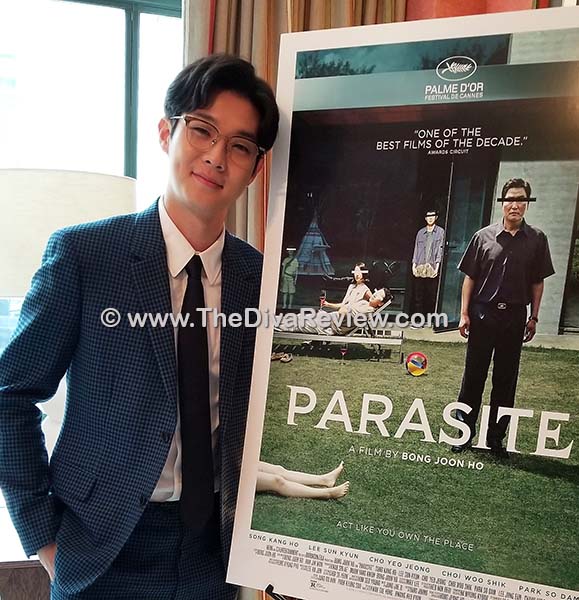
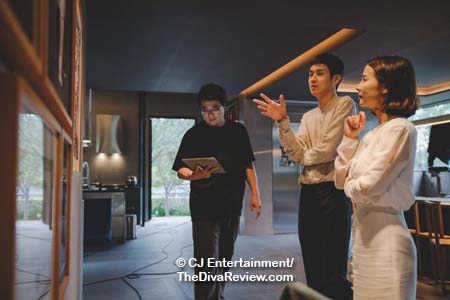 The
Lady Miz Diva: When we spoke back in 2017, it was on the occasion of
your first Bong Joon-ho experience in a small role in OKJA. You were so
impressed and thankful to him for hearing you out and guiding you
through your nervousness, then. What was it like to work together the
second time?
The
Lady Miz Diva: When we spoke back in 2017, it was on the occasion of
your first Bong Joon-ho experience in a small role in OKJA. You were so
impressed and thankful to him for hearing you out and guiding you
through your nervousness, then. What was it like to work together the
second time?
Choi Wooshik: I was dead nervous when I was filming PARASITE. I had a lot of pressure on my shoulders. But when he first approached me after OKJA, he told me I should stay skinny, because Ki-woo needs to be really skinny and kind of looking vulnerable.
At first, he really didnít tell me about any information about PARASITE; he just gave me a little bit of a hint. But after that, finding out that Ki-woo plays a very important role in his family, I almost cried because it was so emotional. And when I was reading the script, it was just amazing, the shifts of tone, and all the characters in play, it was crazy. I felt like I was riding on a roller coaster. {Laughs}
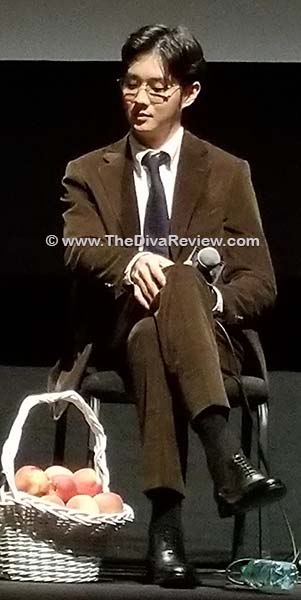 LMD:
You told me about how detailed he was even with the small part you
played in OKJA. Since there is so much more of you in this role,
did he have that same level of detail and instruction for this film, or
did you have more free interpretation?
LMD:
You told me about how detailed he was even with the small part you
played in OKJA. Since there is so much more of you in this role,
did he have that same level of detail and instruction for this film, or
did you have more free interpretation?
CW: I mean, heís always giving us freedom of performing our characters, but he has very compact and unique and strong storyboards. You know he draws, right? So, his storyboards have a lot of details that we could catch on.
Also, he always mentioned that Ki-woo is not dumb: Ki-woo is a really bright kid, but he wasnít lucky enough to get into university, or he kind of lacks of vigor. And Ki-woo knows vigor is really important, so thatís why he pretends to be a guy with a lot of vigor, and teaching Da-hye that vigor is really important. But he didnít have his luck with exams, so his downfall was kind of the exams for university, but he is a really bright kid.
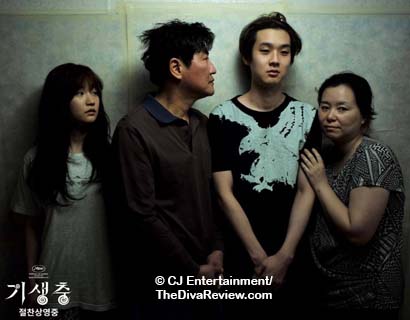 LMD:
Iím impressed by the way Bong presents Ki-wooís family: One might expect
them to be kind of sniping and mean to each other, being in such poor
and run-down circumstances, but they are completely unified. They adore
and support each other.
LMD:
Iím impressed by the way Bong presents Ki-wooís family: One might expect
them to be kind of sniping and mean to each other, being in such poor
and run-down circumstances, but they are completely unified. They adore
and support each other.
That depiction is rare because it would be so easy to play that for laughs, but thatís not what Bong does. Not only is that great writing, itís also excellent chemistry between the actors.
CW: Right. If you are facing some economic or money problems, you tend to be very on edge; you canít be nice all the time. But this family is always loving, even though theyíre facing a hard time with money. But with our family chemistry, it kind of built up just naturally.
In the States, they have trailers for every actor {on movie sets}, right? But in Korea, we donít have any trailers; we would just stay in the same greenroom, just talking about our daily lives, like real family do. And we would ask Song Kang-ho for advice on some hard or difficult scenes, then he would just give us advice like a real father. He was a real father figure on the set. I mean, Park So-dam, who plays Ki-jung, we still call him "Papa," soÖ {Laughs}
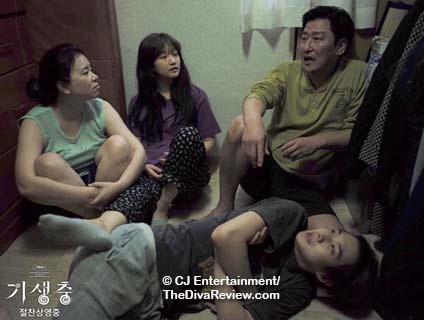 LMD:
You mentioned during a Q&A that you all had stayed on the set for two
months. What was that like? Every day would you come in and everybody
was just hanging out?
LMD:
You mentioned during a Q&A that you all had stayed on the set for two
months. What was that like? Every day would you come in and everybody
was just hanging out?
CW: Exactly. Right after you wake up, you go to the set, you get ready for your shooting, and even right before you go to sleep, we were always together, just talking about our daily lives over casual drinks sometimes, like family.
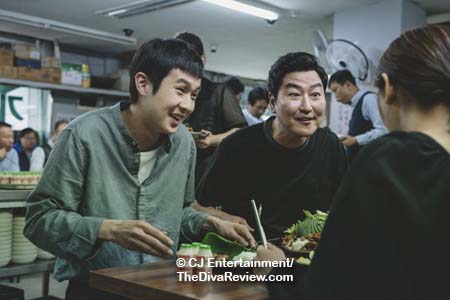 LMD:
In our last interview, we spoke of the difference of emotional levels
between Hollywood actors and Korean actors. You said, ďKorean actors
try to shake the audienceís emotions; they try so hard to express their
emotions. So, good actors in Korea, they hide their emotions, like Song
Kang-ho. When he acts, he doesnít show his emotions, and I think people
like that.Ē
LMD:
In our last interview, we spoke of the difference of emotional levels
between Hollywood actors and Korean actors. You said, ďKorean actors
try to shake the audienceís emotions; they try so hard to express their
emotions. So, good actors in Korea, they hide their emotions, like Song
Kang-ho. When he acts, he doesnít show his emotions, and I think people
like that.Ē
So, tell us what you learned from working with him?
CW: Having this kind of experience on the set, it was almost like the best lesson. It was like school, almost. I learned many things from Song Kang-ho. This time I learned that heís always in character. Itís not like method kind of style, but he tried to be very focused even though we are like laughing behind the scenes, but heís always on point, always on the edge, focused. So, you know, heís one of those figures that you can just go watch him acting, and itís like watching a five hour lesson.
LMD: A master class?
CW: A master class, yeah! {Laughs}
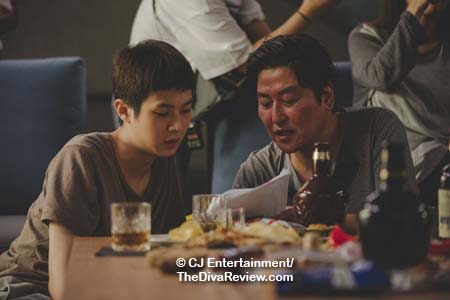 LMD:
I recall there being some interview show where the idol/actor Im Siwan
said that when they co-starred in THE ATTORNEY, Mr. Song was very
upfront about his opinion of Imís skills. Something along the
lines of, ĎMan, your acting sucks.í
LMD:
I recall there being some interview show where the idol/actor Im Siwan
said that when they co-starred in THE ATTORNEY, Mr. Song was very
upfront about his opinion of Imís skills. Something along the
lines of, ĎMan, your acting sucks.í
Iím sure he didnít need to tell you that, but was he that direct about giving his advice or opinion on the set? Or when you sought him out, what kind of guidance did he give you?
CW: Sometimes -- it didnít happen a lot, but sometimes if we are missing something very important -- but he wasnít really direct to us. I donít know why, but he would just come and ask us some questions. Like, he wouldnít just say, ďYo, the answer is this. Just do that.Ē He would just go around it, kind of making us figure out the answer by ourselves. So, he would just ask us some questions. Itís like those sensei. Heís really good on set.
One thing that I learned from him, too, was you always communicate to each other. Because in Korea, sometimes, because itís a cultural thing, like younger generations have to be really polite to older generations; so, sometimes itís really hard for younger generations to go comfortably bonding with older generations. But Song just kind of breaks that away on the set; itís like, actors to actors, not like younger generation to older generation.
LMD: We had talked about that in our previous interview, how sometimes veteran actors will not interact with younger actors because of that gap. Itís so nice to hear that Mr. Song doesnít adhere to that. I wonder if thatís one of the reasons Director Bong loves him so much?
CW: Maybe, because Bong does the same way, too.
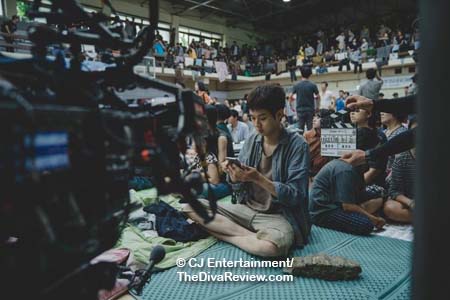 LMD:
One of favourite shots in the movie is between you and Mr. Song in the
gym, after the flood, and Ki-woo and Ki-taek are talking in the dark.
Ki-woo says ďDad, Iím sorry for everything.Ē
LMD:
One of favourite shots in the movie is between you and Mr. Song in the
gym, after the flood, and Ki-woo and Ki-taek are talking in the dark.
Ki-woo says ďDad, Iím sorry for everything.Ē
In that scene, I felt like I didnít see Wooshik and Song Kang-ho anymore; you both disappeared and had transformed into father and son. Tell us about that beautiful scene.
CW: At first, on the storyboard, or in the script, Ki-woo didnít cry on the paper. When I was acting, I donít know why, but I kinda got emotional, and tears kind of welled up in my face. But that atmosphere, I think Song just created it, and I just felt it right away, so it kinda got me very emotional; because at that point, Ki-woo is out of his mind.
Heís so dedicated to the plan, when that went wrong, heís just out of it, because, you know, when our house got flooded, the stone kind of pops up through the water, right? Thatís like him not stable. Heís unstable. Heís watching this heavy stone floating up in the water, so, heís not really stable.
I wasnít meant to cry in that scene, but somehow it got me emotional, and I just teared up. But Bong loved it, Song loved it, and I think thatís like one of my favorite moments of my life, because sometimes some emotions just come; you donít plan that, but when I was acting in that scene, it just came, and I was like, ĎWow, I felt something weird.í
LMD: So, you did disappear?
CW: I think so, yeah. {Laughs}
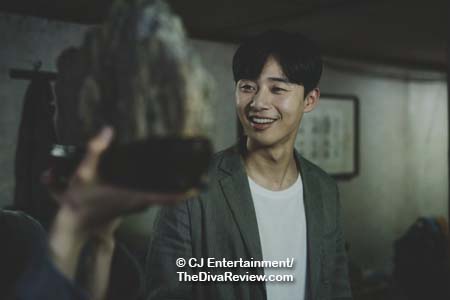 LMD:
Perfect segue: What does the stone mean? What did Ki-woo mean when he
said the stone was clinging to him?
LMD:
Perfect segue: What does the stone mean? What did Ki-woo mean when he
said the stone was clinging to him?
CW: You know, this movie has a lot of metaphors; like the stairs, water, the stone, and, I donít know, itís on individual opinions, but even Bong didnít really give me an answer to what that stone meant. When I was acting, I felt that stone was kind of like heavy responsibility for Ki-woo; like how he had to carry that heaviness to carry his family to a successful life. But some say that the stone meant an apology gift.
Do you know how Min {Park Seo-joon}, my friend, gives it to us as a gift, right? But, to think about it, Ki-woo is not the kind of person that he would kill someone with that stone, so I think he was bringing the stone to the downstairs as a gift of apology. So, it meant really a lot of things, but my initial thought was it was heavy responsibility.
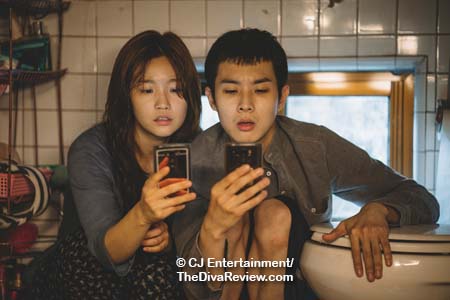 LMD:
Does the Kim family ever think theyíre wrong? It felt like sometimes Ki-woo
wanted something different than this scamming life? What do you make of
his take on the way they live?
LMD:
Does the Kim family ever think theyíre wrong? It felt like sometimes Ki-woo
wanted something different than this scamming life? What do you make of
his take on the way they live?
CW: I think they were just trying to survive. There were facing some economic problems, but they wanted to survive. I donít think they actually thought it was some kind of bad action, but they just wanted to survive, and he did it for his family. Everyoneís doing it for their families, so I think I think that was their consciousness.
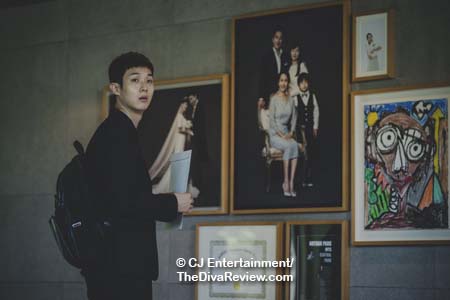 LMD:
PARASITE has a lot of interesting views about society in general in this
film, but there are things that I understand run deep in South Korean
society. The constant references to smell for one thing. Mr. Park
continually emphasising his subordinates ďcrossing the line.Ē
LMD:
PARASITE has a lot of interesting views about society in general in this
film, but there are things that I understand run deep in South Korean
society. The constant references to smell for one thing. Mr. Park
continually emphasising his subordinates ďcrossing the line.Ē
For a movie that is pretty brutal about the underside of Korean classism and society, itís done very well back home. What do you think people are responding to?
CW: At first, I think they loved the actorsí ensemble. I think the message came after the ensembleís acting. You know how, like I said before, we have that line that we cannot cross; like younger generations canít say ďHi,Ē to the older generations, itís like crossing a line? We know that we are supposed to be polite to the older generations, but sometimes I think it needs to be changed sometimes. But the Korean audience kind of felt that, and I think theyíre liking it. Theyíre loving it.
LMD: Speaking of ensemble; your other amazing ensemble film had something to do with zombies on a subway, or somethingÖ.
CW: Yeah, yeah, yeah, TRAIN TO BUSAN. {Laughs}
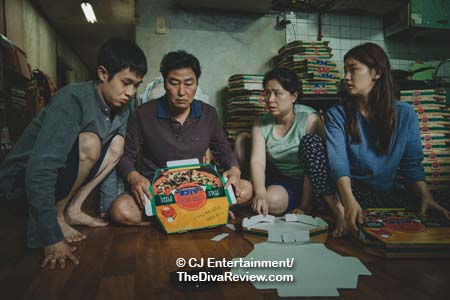 LMD:
Now you have this incredible group of actors around you in PARASITE. As
an actor, do you feel more or less pressured when surrounded by a group
of experienced peers? Or is it preferable to you -- or more pressure --
to having a more individual performance, as in SET ME FREE?
LMD:
Now you have this incredible group of actors around you in PARASITE. As
an actor, do you feel more or less pressured when surrounded by a group
of experienced peers? Or is it preferable to you -- or more pressure --
to having a more individual performance, as in SET ME FREE?
CW: I think it goes both ways. I mean, if youíre really surrounded by really talented people, then you also have this pressure that you have to be equally talented, so you have to perform better. But sometimes that gives you motivation -- it motivates you. Like,í Oh, okay, they are so good. Okay, I gotta do better.í It gives you good synergy.
But sometimes, in different movies where I have to work with less people, or by myself, then that also gives me a lot of pressure, like, ĎOh, okay, itís only my part, so I have to do better. I have to get the audienceís attention by myself.í I think it goes both ways, and I love the way we played it in PARASITE, because I was just surrounded by the best in Korea, so it was really good.
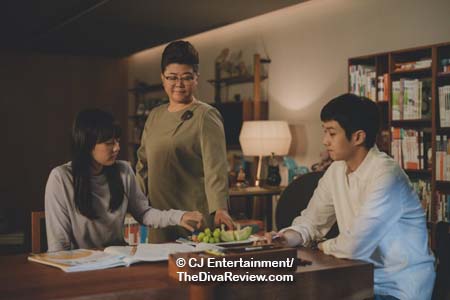 LMD:
This is such a very different role for you than anything youíve done: I
remember in our first conversation, you said something to the effect of,
ĎIf youíve seen me, you know my personality is not cool,í but in
PARASITE, youíre like this Mr. SeducerÖ
LMD:
This is such a very different role for you than anything youíve done: I
remember in our first conversation, you said something to the effect of,
ĎIf youíve seen me, you know my personality is not cool,í but in
PARASITE, youíre like this Mr. SeducerÖ
CW: {Laughs} NaaawwwwwÖ I tried to be. {Laughs}
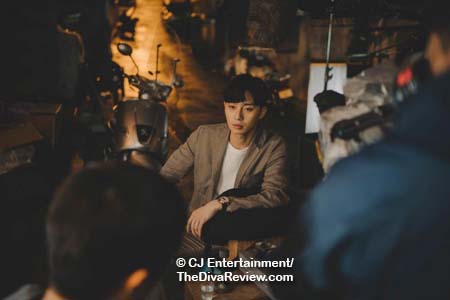 LMD:
ÖAnd youíre messing around on your best friend, Min {Park Seo-joon},
who asked you to look after the girl youíre macking on. Dude, what is
that? Was that your first time playing that kind of role? What was
that like for you?
LMD:
ÖAnd youíre messing around on your best friend, Min {Park Seo-joon},
who asked you to look after the girl youíre macking on. Dude, what is
that? Was that your first time playing that kind of role? What was
that like for you?
CW: {Laughs} Like two days before, we premiered in New York, I remembered, because I was getting so embarrassed -- you remember that scene where I had to approach Da-hye to kiss, right? People were screaming because it was too cheesy, and they could watch it. I couldnít watch it. I was getting so embarrassed. {Laughs} Bong sat right behind me. Bong was giggling. Song was giggling. It was really hard to act that part.
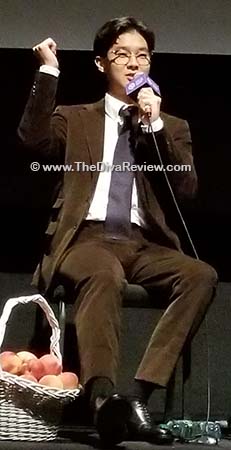 LMD:
I didnít realise until the end credits that you are actually singing the
final song. How did that come about?
LMD:
I didnít realise until the end credits that you are actually singing the
final song. How did that come about?
CW: I thought Director Bong was joking, because he said, ďOh, do you want to sing for the movie?Ē And I thought he was joking, so I was like, ďOh yeah, okay,Ē but he actually wrote the song, and he gave it to me. At first, I was like, ĎOh no, I canít do it, because Iím not a good singer. I canít put a negative vibe to this masterpiece. I canít ruin it.í The song was actually a narrative song, so I thought, ĎOkay, I think itís good, so I will try.í I actually went two weeks for vocal training for that.
LMD: Whoa, you really took it seriously.
CW: {Laughs} I mean, I didnít want to ruin the masterpiece. At first the note was really high, so I couldnít sing it, so they actually lowered down the key.
LMD: Director Bong had mentioned that the film was initially inspired by his college days as a tutor. Did he share anything from his own experience that helped you create Ki-woo?
CW: Oh yeah, when I was performing the tutor scene, he actually told me the story that he taught people. He shared about his experiences; how he saw different classes while he was tutoring some kids. So, that actually gave me some thoughts about Ki-wooĎs part.
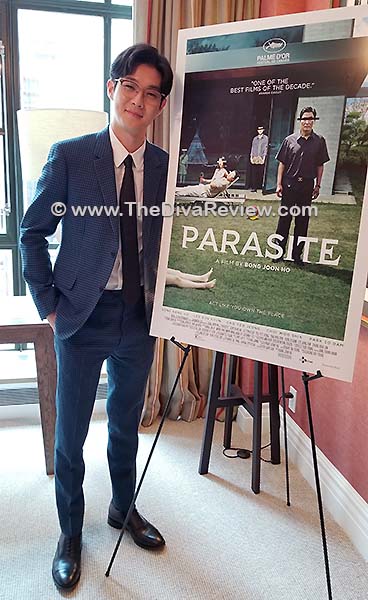 LMD:
Whatís next for you?
LMD:
Whatís next for you?
CW: Right now, Iím working on this movie ó I donít know if itís the right title, but itís GENERATION OF POLICEMEN. I have these two movies working in Korea, but definitely if I have a chance, I would have some good transition to the States. I donít know if this is ever going to happen, butÖ
LMD: Last time we spoke, you told me how originally you wanted to be a theatre director, and that you were interested in making short films or a web series. Are you any closer to that?
CW: After we spoke, I did have some writing that I did. I wanted to try out some streaming or short series on YouTube, but as I got older I kind of found it really difficult, because I canít work and do that at the same time. So, I donít know, I keep trying it, but Iím not sure if itís going on happen anytime soon.
~ The Lady Miz Diva
Oct. 7th, 2019
Click Here for Our
Exclusive Interview
with PARASITE
Star, Acting Legend, Song Kang-ho.
Click Here for Our
Exclusive Interview
with PARASITE
Star, Park So-dam.
© 2006-2022 The Diva Review.com
|
|























































































